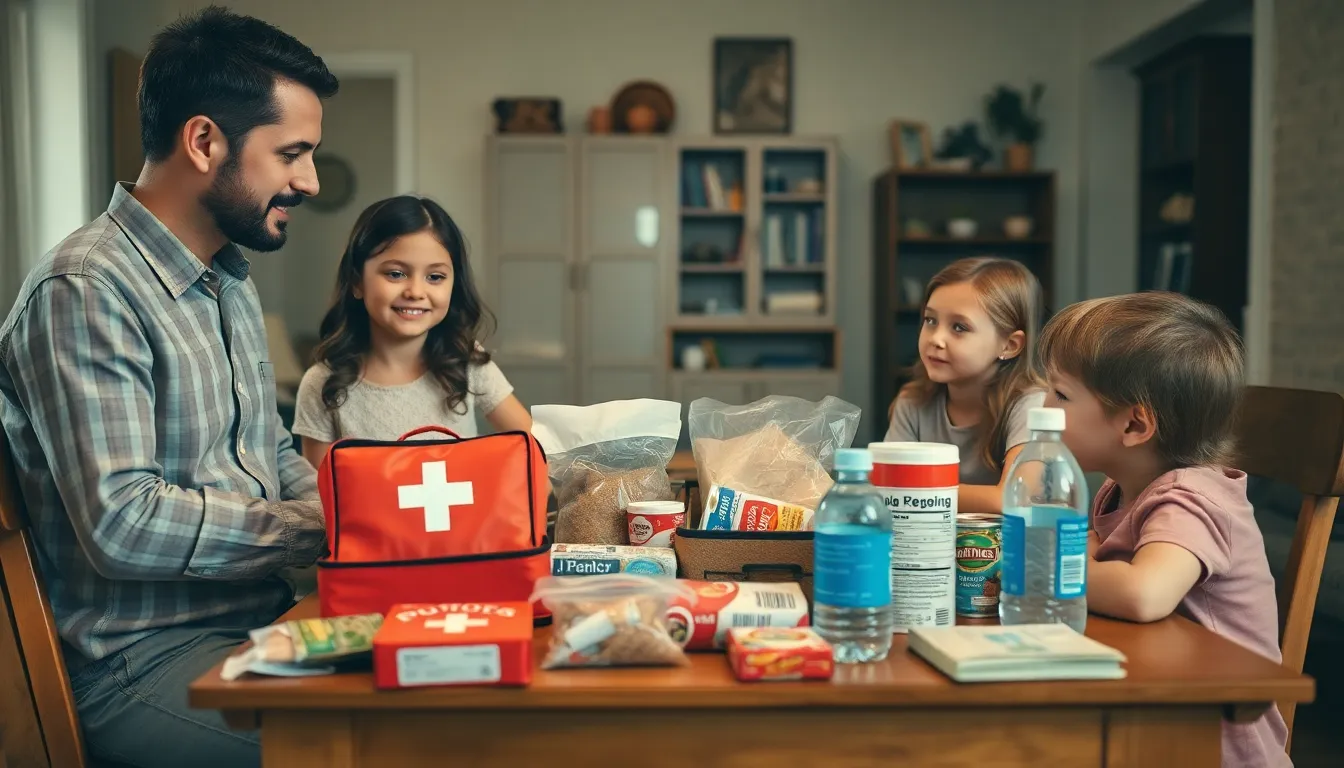In a world where unexpected surprises lurk around every corner, being prepared isn’t just smart—it’s essential. Picture this: you’re enjoying a cozy evening at home when suddenly the power goes out. Do you have a flashlight or are you fumbling around like a contestant on a game show? Developing preparedness habits can transform those potential panic moments into opportunities for calm and collected action.
Imagine having a go-bag ready for anything from a surprise camping trip to a zombie apocalypse (because you never know). It’s not just about stockpiling cans of beans; it’s about creating a lifestyle that keeps you one step ahead. With a few simple habits, anyone can master the art of preparedness, making life’s little hiccups feel like a walk in the park. So why not dive into the world of preparedness habits and turn chaos into confidence?
Table of Contents
ToggleUnderstanding Preparedness Habits
Preparedness habits encompass routines and mindsets that equip individuals for emergencies. Developing these habits fosters confidence and reduces anxiety in unexpected situations.
Definition and Importance
Preparedness habits involve consistently engaging in activities that enhance readiness for emergencies. These habits prove critical as they transform abstract ideas into actionable strategies. Importance lies in their ability to prepare individuals for various crises, from natural disasters to health emergencies. Participants often describe feeling more secure when they possess practical plans and resources at hand. Preparedness habits create a structured approach to navigating unpredictable events, ensuring that individuals maintain clarity when decision-making becomes essential.
Key Components
Key components of preparedness habits include planning, training, and resource management. Establishing a well-defined emergency plan allows for coordinated responses when faced with a crisis. Regular training sessions, such as first aid courses, equip individuals with necessary skills, enhancing their self-efficacy during emergencies. Resource management involves creating and maintaining supplies like food, water, and first-aid items that support self-sufficiency. Staying informed about potential risks and reviewing plans periodically remain vital elements that ensure preparedness habits evolve with changing circumstances. Implementing these components fosters resilience and empowers individuals to confront uncertainties with poise.
Types of Preparedness Habits

Preparedness habits consist of various frameworks that individuals utilize to confront unexpected situations effectively. These habits can be tailored to specific needs and contexts.
Emergency Preparedness
Emergency preparedness centers on creating strategies to respond quickly during crises. Developing an emergency kit, which includes crucial items like food, water, and first aid supplies, ensures readiness in unforeseen events. Regularly updating this kit helps maintain its relevance. Furthermore, practicing evacuation routes and emergency contacts promotes familiarity with safety procedures. Engaging in community preparedness programs enhances individual skills and fosters connections, allowing for collective safety.
Personal and Family Preparedness
Personal and family preparedness emphasizes aligning individual routines with family needs. Establishing a family emergency plan creates a unified response to potential disasters. Identifying roles and responsibilities for all family members cultivates accountability and instills confidence. Regular family discussions about potential risks strengthen resilience and awareness. Additionally, practicing drills reinforces the understanding of safety protocols and boosts overall preparedness. Investing time in knowledge-sharing about local threats empowers families to navigate uncertainty effectively.
Developing Effective Preparedness Habits
Preparedness habits significantly enhance an individual’s ability to manage unexpected situations. These habits develop through consistent practices and awareness.
Setting Goals
Individual goals provide a foundation for effective preparedness. Establishing achievable objectives creates direction in emergency planning. For instance, setting a target to complete an emergency kit within one month enhances focus. Specific goals, whether for training or resources, facilitate measurable progress. Noting goals and tracking achievements fosters motivation and accountability. Each small accomplishment contributes to larger readiness efforts, ensuring that preparedness remains a priority.
Creating a Plan
A well-designed plan acts as a roadmap during emergencies. Crafting a comprehensive emergency plan includes identifying risks and outlining response strategies. Defining roles within the family ensures everyone knows their responsibilities. Regularly updating the plan keeps it relevant and effective. Engaging in discussions about the plan promotes understanding and collaboration. Utilizing community resources, like local preparedness programs, strengthens personal plans. By creating a clear, actionable strategy, individuals and families are better equipped to handle crises.
Tips for Maintaining Preparedness Habits
Maintaining preparedness habits requires consistent effort and engagement. Regular routines help foster resilience and readiness for emergencies.
Regular Training and Drills
Participation in regular training and drills enhances emergency readiness. Engaging in hands-on practice solidifies knowledge and builds confidence. Family members should meet to review their roles during a crisis. Scheduling practice sessions ensures everyone understands response plans. Supervising these activities promotes accountability and teamwork. Connecting with local organizations for community drills reinforces collective preparedness skills. Evaluating performance during drills allows families to identify areas for improvement. Adjusting tactics based on evaluation results leads to more effective responses in real situations.
Staying Informed
Staying informed about potential risks strengthens preparedness habits. Monitoring local news and weather updates ensures awareness of emerging threats. Individuals should seek resources that provide information on best practices for various emergencies. Attending workshops or webinars enables people to learn about new safety techniques. Following reliable social media accounts and emergency management agencies offers timely updates. Regularly revisiting and updating emergency plans reflects changes in circumstances and new information. Encouraging open discussions about risks fosters a culture of awareness and preparedness.
Preparedness habits are essential for navigating life’s uncertainties with confidence and composure. By adopting proactive routines and mindsets individuals can transform potential chaos into manageable situations. Developing a well-structured emergency plan and engaging in regular training not only enhances readiness but also cultivates a sense of security.
Families can benefit from aligning their preparedness strategies through open discussions and collaborative drills. This shared commitment fosters resilience and accountability among family members. Staying informed about risks and periodically reviewing preparedness plans ensures that individuals remain equipped to handle whatever challenges arise. Ultimately, embracing these habits empowers everyone to face emergencies with poise and assurance.





